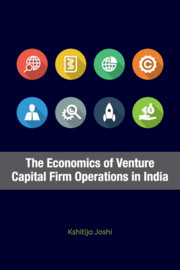Book contents
- Frontmatter
- Contents
- List of Tables
- List of Figures
- Acknowledgements
- 1 Introduction
- 2 Ecosystem and Strategic Decision Making
- 3 Context and Methods
- 4 Fund Raising: Systematic and Non-systematic Influences
- 5 High-Tech Clusters in India
- 6 Investment Strategies
- 7 Involvement and Value-Add in Investee Ventures
- 8 Venture Capital Exits: What Drives Success?
- 9 Conclusion
- References
- Index
5 - High-Tech Clusters in India
Published online by Cambridge University Press: 30 April 2020
- Frontmatter
- Contents
- List of Tables
- List of Figures
- Acknowledgements
- 1 Introduction
- 2 Ecosystem and Strategic Decision Making
- 3 Context and Methods
- 4 Fund Raising: Systematic and Non-systematic Influences
- 5 High-Tech Clusters in India
- 6 Investment Strategies
- 7 Involvement and Value-Add in Investee Ventures
- 8 Venture Capital Exits: What Drives Success?
- 9 Conclusion
- References
- Index
Summary
Introduction
The aim of this chapter is to present an in-depth analysis pertaining to the demand (Dd) side of the venture capital (VC) ecosystem. The demand side comprises start-ups into which the VC funds are directed. The focus here is to understand the nature of systematic influences that impact the emergence and growth of start-ups, especially start-up clusters. For ventures in high-technology domains, the start-up ecosystem, incubators/business accelerators, and most importantly VC funds play a vital role. Then there are other attributes pertaining to macroeconomic parameters, industrial structure, infrastructure, and government policies that are givens. Literature also points out that start-ups rarely emerge on a stand-alone basis. Rather, they do so in the form of geographic clusters. Such clusters are often specialized in their respective domains (such as biotechnology or information technology), resulting in the accumulation of a critical mass of relevant skills (Reynolds 1993; Reynolds and Storey 1993). The positive externalities resulting from the same in the form of ‘knowledge spillovers’ are regarded as one of the most important determinants behind the emergence of such clusters (Jaffe, Trajtenberg, and Henderson 1992).
Conceptual Framework on Demand for VC Funds
The broad framework for analysing the demand for VC funds has been given in Figure 5.1, followed by the proposed hypotheses.
Proposed Hypotheses
Hypothesis 1: Robust macroeconomic conditions have a positive impact on the emergence of high-tech clusters.
Hypothesis 2: Robust start-up ecosystem parameters have a positive impact on the emergence of high-tech clusters.
Hypothesis 3: Presence of robust physical, financial and social infrastructure have a positive impact on the emergence of high-tech clusters.
Hypothesis 4: Factors such as Internet penetration and a distinct presence of multi-national corporations (MNCs) have a positive impact on the emergence of high-tech clusters.
Hypothesis 5: Conducive conditions, such as pleasant weather conditions and low crime rates, positively impact the emergence of high-tech clusters.
Each of these hypotheses has multiple hypotheses embedded within.
Sample, Data, and Methods of Analysis
This study based on secondary data covers the early-stage companies from six major Indian start-up hubs (Bangalore, Chennai, Hyderabad, Kolkata, Mumbai/ Pune, and the National Capital Region [NCR]) between 2005 and 2013. Due to the geographical proximity of Mumbai and Pune, they have been considered here as a single cluster. Similarly, owing to the geographical proximity of New Delhi, Gurgaon, and Noida, these have been considered together in the NCR cluster.
- Type
- Chapter
- Information
- Publisher: Cambridge University PressPrint publication year: 2020



